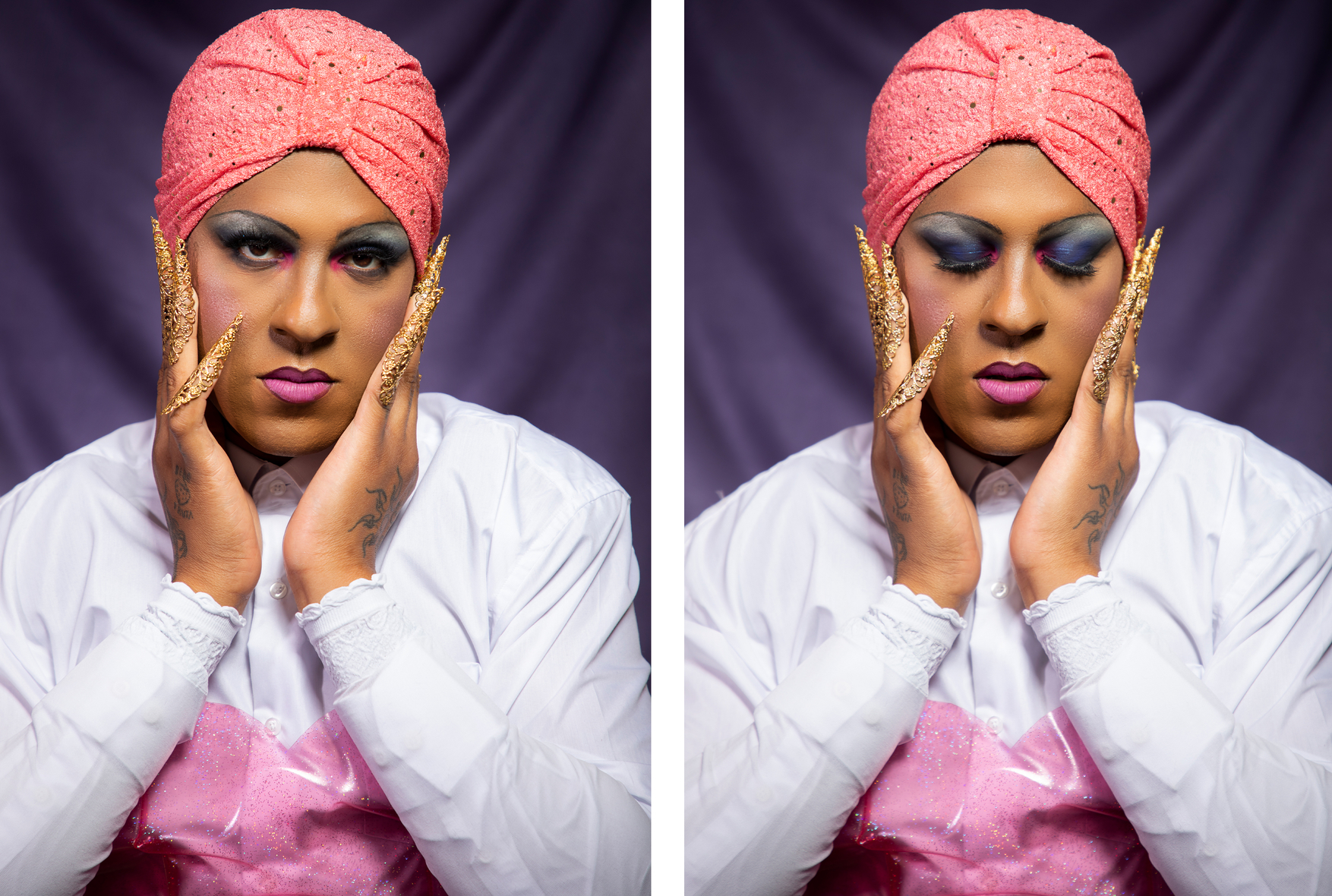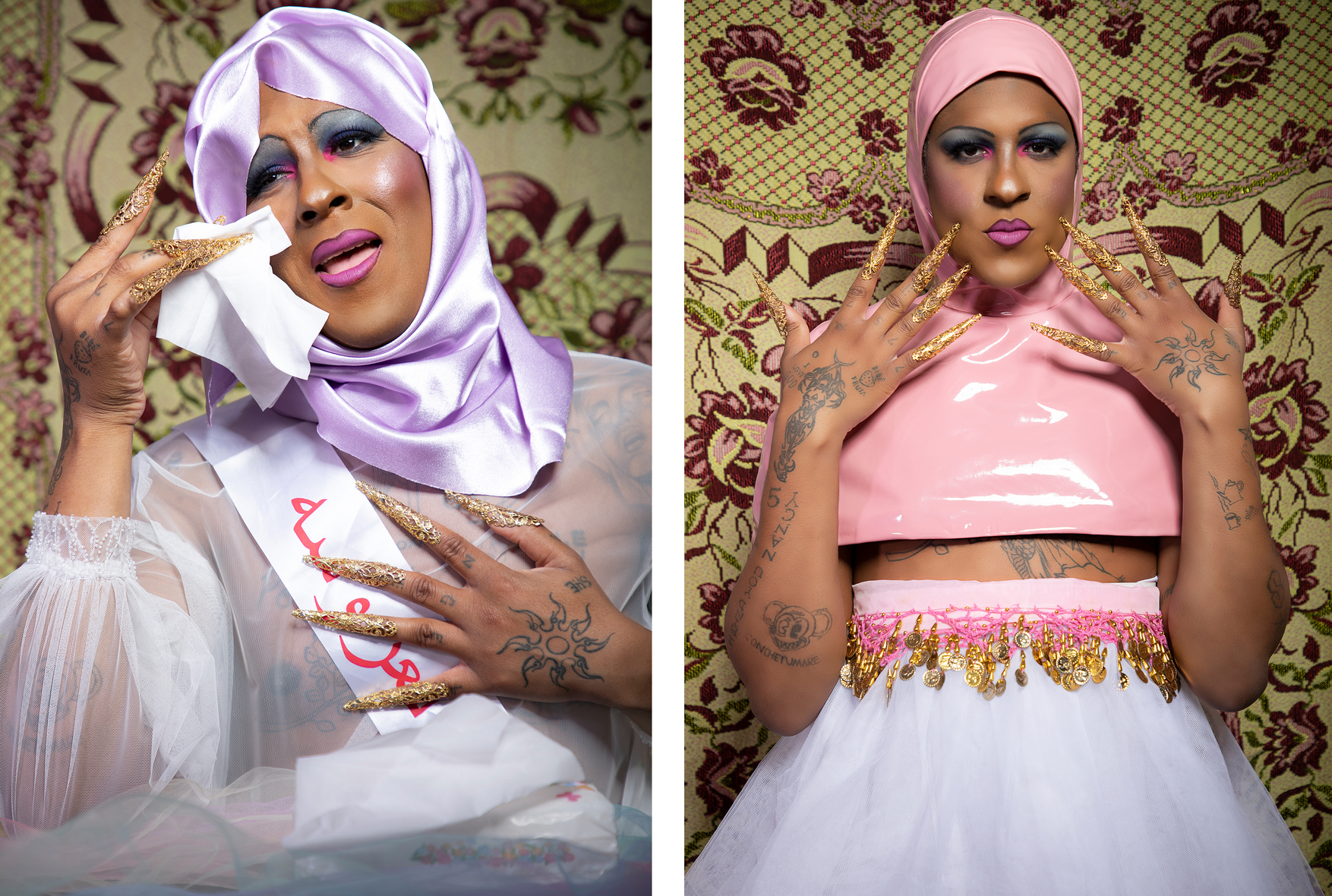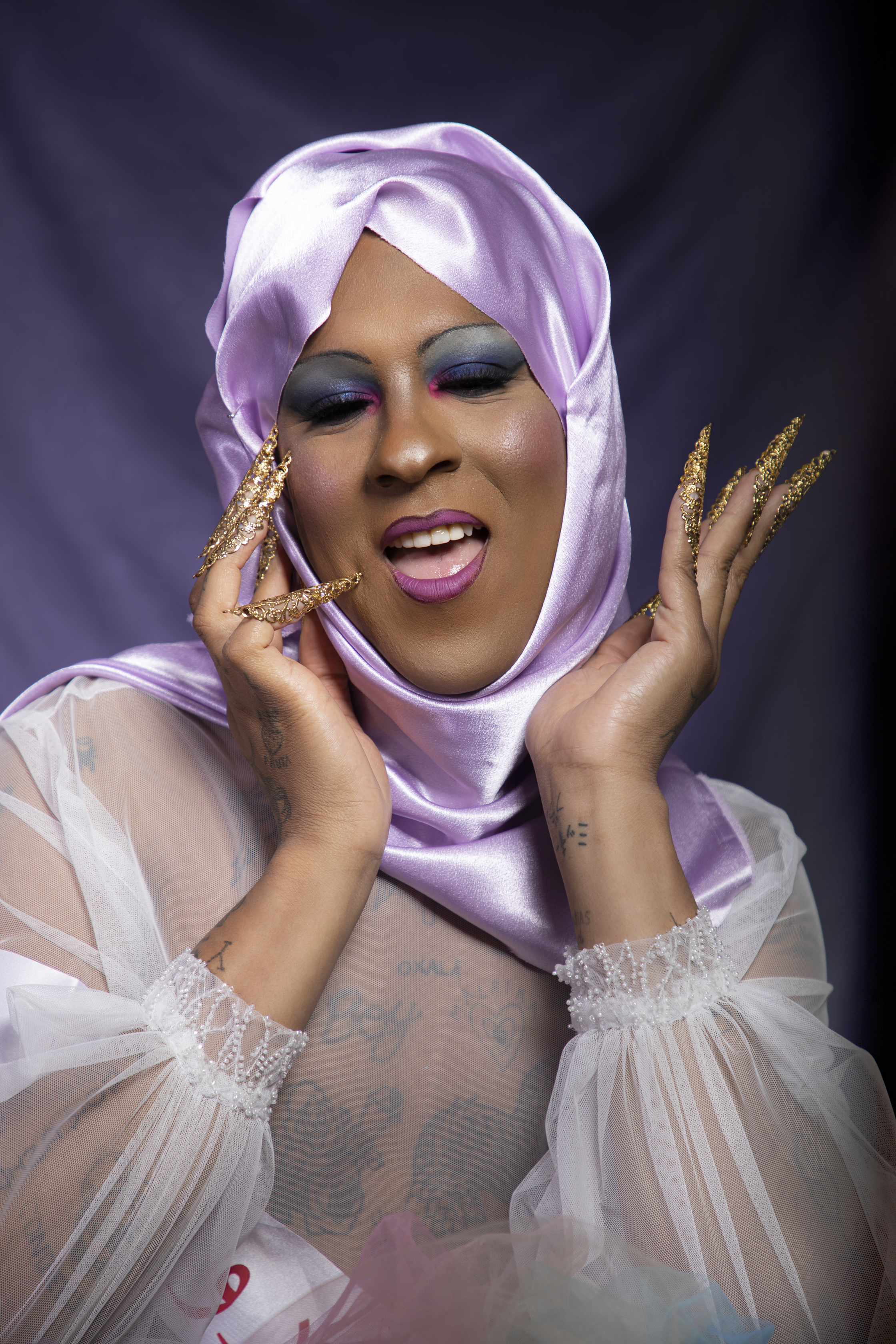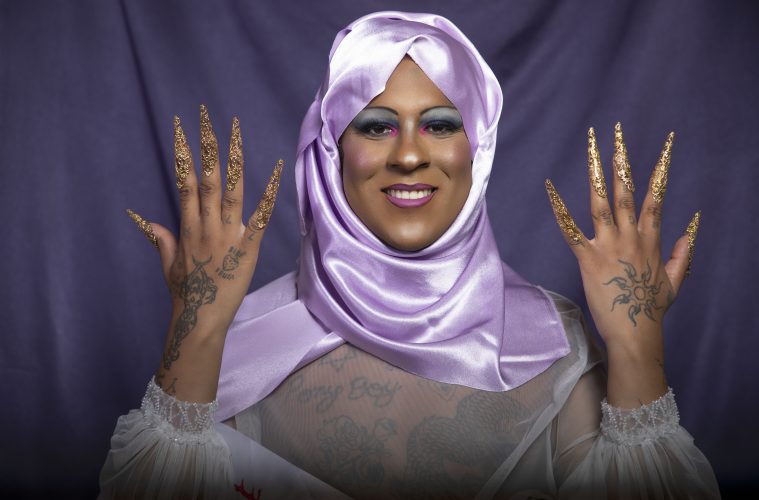Interview by Shukri Lawrence
Sitting Editors: Eliza Marks and Khalid Abdel-Hadi
Photographed by: Omar Braika
Creative Direction by: Shukri Lawrence
Makeup by: Zaina Allozi
Styled in full Trashy Clothing x My.Kali Magazine collab-collection
This feature is from the Weddings and Marriages issue (here)
American rapper, actress, performance artist, poet, and activist, Mykki Blanco (they/them), provides a needed voice in the world of music and art. With powerful pieces of work like ‘Wavvy’, ‘Coke White, Starlight’, and ‘Dark Ballet’ their talents radiate through their music, lyrics, and performance. As a femme-identifying, genderqueer transperson, Mykki is one of the queer musical pioneers of this generation.
Their foray into the music industry began with experimental mixing of performance art, poetry, and music. Mykki has never approached their work as many musicians might, with concerns about music, albums, or fame, but rather approached their music as if curating a museum or experience to be documented. This is true even of their earlier endeavors, such as their punk experimental band, “No Fear,” formed with two friends, in which Mykki would recite poetry over guitar and bass lines.
Mykki announced their first three-stop tour in Palestine at the beginning of 2020, which was to hit Haifa, Ramallah, and Beit Sahour. Unfortunately, the tour had to be canceled shortly after Mykki’s arrival to Palestine due to lockdowns related to COVID-19. This has not stopped Mykki from exploring Palestine and Jordan during the trip. We sat down with Mykki to discuss Palestine, BLM, marriage, and the privileges of safe spaces.
I noticed that you exude a radiant energy while watching you perform live in Jordan. Can you describe what goes on in your head while performing? What are you thinking? How does it feel?
Performing comes naturally to me. I built my career on lots of touring, especially when my work existed mainly on Tumblr, Instagram, and Twitter, and was viewed by an international network of queer people who were discovering me on those platforms.
I really like people, I am a people person. I am an optimist. I enjoy other people. I enjoy people’s company. I’m a Believer. I’m a humanist. I really do believe that we have great qualities as spiritual beings, and can continue to enlighten each other.
When I come into a space, I learn to read the space and the dynamic. There are so many social cues that your audience gives you that will help you engage them. It’s like how someone would collect Pokemon: all of these things become a skillset overtime.
It seems like you provide a safe space for you and your audience virtually. Is this also something you strive for when you perform?
When you are of a particular community, you need to contextualize the needs of that community to think about what a “safe space” would look like.
I actually had a conversation last night with a friend who is Palestinian/Lebanese, and he told me that the idea of a safe space is a Western idea that has been fed to the rest of the world. In so many cultures people could just exist. I said yes, and I agree and know it is true to a point. In patriarchal societies, people who are overtly feminine don’t fit in many spaces and have to hide. So, the idea that a “safe space” is a Western creation and is only half true. Queer people who are femme-presenting, gender non-conforming, or trans-butch, gender non-conforming people have it the hardest.
“…having predominantly been with Palestinian people, is that the Palestinian identity is not going to be erased. It is such an intrinsic part of what it means for them to exist, period.”

Mykki Styled in full Trashy Clothing x My.Kali Magazine collab-collection. Makeup by Zaina Allozi. Photographed by Omar Braika
You reclaim slurs that are often used to target particular identities, and empower audiences in your lyrics. One that stood out to me is, “I pimp-slap you bitch, with my limp wrist.” Can you talk me through your thought process while writing lyrics?
The idea of reclaiming, whether I consciously do it or not, is super important to me. I’m someone who’s been abused, and I think this is a very unfortunate way to garner wisdom. But you can either let the trauma consume you, or you can somehow find a way out, and that way out can also be very traumatic, turbulent and painful.
I have a great life, but I’ve also had some things happen in my life that were extremely traumatic and extremely painful. I know I have a big threshold for how f***ed up the world can be but am still optimistic about it. I’m happy that I have that quality. One of my closest friends told me, “you’re one of the most resilient people that I know,” and I think that comes from my mother’s side. No matter how many times you are knocked down, you’re still physically here. You can keep going if you know you can come out of it.
The way you’ve described dealing with abuse is strong and beautiful. Do you have more advice on how to handle it?
My advice would be to always, no matter what, try to thrive in whatever situation you’re in. What’s important is that you’re here. As human beings, we’re here to live a purpose-filled life. Once you find a sense of purpose or a path, you can find some way to persevere.
One of the things that has left a big impression on me from this trip, having predominantly been with Palestinian people, is that the Palestinian identity is not going to be erased. It is such an intrinsic part of what it means for them to exist, period. No matter the cost, Palestinain culture is not going to be assimilated. It is not something other people in other places, and can’t just be taken for granted.
Can you talk a little more about your trip to Palestine? What were some of the responses you received about the tour?
There are so many things I’ve learned on this trip that I didn’t know before. I now realize that just calling it the “Palestine Tour” was a political statement by itself. I played in Tel Aviv 7 years ago, and I didn’t understand the full implications of what was happening back then. I can’t pretend that I didn’t know, but being black American I was always fed this ideology of, “Jews hate Arabs, Arabs hate Jews… You’re black, and we have our own problems… It’s a complicated situation.” Overtime, and especially on this trip, I realized it’s not so complicated that people can’t understand it.
I think I really started to understand what was going on once people started to use the word “apartheid”. I had never heard the situation described as apartheid before, and when I was first introduced to the conflict as apartheid, I realized it was that and not a just conflict. This is not a two-sided coin.
Some of the comments on my Instagram post about Palestine tour, even though it said nothing against Israel, opened my eyes to how entrenched Zionism and racism is in the country. I was telling my friend that I want to make “going to Palestine” like “going to Los Angeles,” meaning I wanted it to be normal and not have signs of Western propaganda.
This trip was not organized by a manager or agents. I just wanted to come to the region myself, so I reached out to people myself. Experiencing this trip was amazing, and hopefully when things calm down with this very extreme moment in our human history, we can somehow return!

Mykki Styled in full Trashy Clothing x My.Kali Magazine collab-collection. Makeup by Zaina Allozi. Photographed by Omar Braika
My.Kali’s new issue explores marriage and unity. Can you tell me about your relationship with the topic, past or present?
I grew up in a single parent home. My mom is a very strong person. I think growing up with a very dominant mother was a really good thing for me because it gave me an enormous respect for women, and the things that women and femmes have to go through. But I had to create my own idea of what a happy marriage is for myself, because I never saw marriage close-up.
I had my first serious relationship about 3 years ago. We’re no longer together, but it was really one of the best experiences I’ve ever had. He taught me so much about taking care of myself and improving my self-esteem, and we both did that for each other. When that relationship ended 7 months ago, it ended well, but I didn’t know how I would do being single again.
One of the things I realized as I’ve gotten older is that it takes work to take care of yourself. Giving yourself space and time to really get to know yourself is worth it because you come into your next phase so much stronger, so much wiser, and grown.
Do you ever see yourself getting married?
I definitely see myself getting married in the future. I believe in marriage, I like the idea, and I’ve always wanted to have a big three-day wedding!
On another personal note, you’ve been publicly open with becoming HIV+. What advice would you give to someone who recently found out they’re HIV+?
Know that it is definitely not the worst thing that’s going to happen to you. You will find a community of people that will accept that whether you decide to be open about it or not. Depending on if it is culturally safe or not, I think that it’s important to be as open about it as possible. The more open you are with the people that you can be, the more freedom you will feel, and you won’t feel like you have to hide as much. The feeling of having to hide breeds a very unhealthy psyche. Look after yourself in a way that is outside of standard medical care, because obviously medicine is very important, but also making common sense decisions with diet and exercise. Know that love is a very possible thing.
I remember when I first discovered I was positive I thought the world was over, and that I would never find love or even never be loved. Don’t think that once you’ve been positive, you can’t be with someone negative. My partner of three years was negative. Look after yourself, and don’t necessarily take what others say to you at face value. I think you naturally start thinking of your health, your livelihood and your mental health in a different way when it happens. I definitely think there are much worse things.

Mykki Styled in full Trashy Clothing x My.Kali Magazine collab-collection. Makeup by Zaina Allozi. Photographed by Omar Braika
Having recently released new music from your new album, could you tell me more about it and its new sound?
The album is a lot about coming into my own as a musician. I’ve taken my music more seriously the last 4 years, and I really want to continue growing in that respect. I also really tried to nurture a lot of relationships musically with this project, and that’s also something I never done before.
It’s been an interesting ride. The album was recorded all of 2018, and was originally going to come out in 2019. Thank god it didn’t because it’s so much better now than it was then. I collaborated with a lot of people on this album that I have always dreamed of, like ANOHNI, Kelsey Lu, and Devendra Banhart to name a few. The stars really aligned. This album has a lot to do with composition, relationships, and forging ahead with maturing musically.
This sounds beautiful and exciting! Do you know when you’ll release the album?
I would hopefully like to be releasing my new album in the Fall. I worked really hard on it, and it’s really the next step in my career. This album is going to be the gateway for me to be doing bigger and better things with my life and career. It feels like this project has given me a clean slate, and it’s full of good energy and hard work from collaborators and everyone who has supported it.
I really believe in divine timing, I consider myself a very spiritual person and really believe in divine timing. For now, however, we’ll have to wait and see in the coming months which record label will release it.
Mykki’s career continues to expand both professionally, having recently released a soulful and sultry collaboration, “Collide,” with Shea Coulleé from “RuPaul’s Drag Race”, and in their activism and public engagement.
Mykki Blanco also recently took part in an almost 80-hour broadcast on Palestine’s Radio Alhara as a digital protest and to raise awareness of Israel’s planned annexation of the West Bank alongside many other artists such as Habibi Funk, Nicolás Jaar, and Kampire.
We compiled a few paragraphs below, which show that the struggle for recognition and against hatred must extend across a broad scope #BLM
These last few days and weeks have been an emotional rollercoaster. If you’re feeling exhausted just think about the families and loved ones of those who were killed by the police. Collectively we have to engage in self care when we can. We are not done protesting and engaging in these history defining conversations and decisions to come to terms with the centuries long systemic oppression of Black people in the United States of America.
It doesn’t matter whether a protest is peaceful or not. White Americans have been destroying Black towns, facilitating massacres, looting, riotining, burning bodies, enslaving, and stealing from Black people for centuries. Colonial white Americans rioted and looted to make a stand for their freedom from the British. Our constitutional rights were formed from White aggression. The Police only exist to protect White people from their former slaves.
Don’t forget, during this pandemic, Donald Trump and The Federal government gave millions and millions of dollars to big corporations and chain franchises that were meant to go to small businesses. That’s institutionalized looting!
Pride is here and corporations and media outlets (however well intentioned) are going to begin to try and actively shift our attention away from the killings of both unarmed Black People and the murders of Transgender People particularly Black Trans women. They will do this because they need to market Pride so that you feel as if you have something to celebrate and spend your money. Pride for these corporations are about monetary value and most are in bed with behind closed door politics. They don’t want you protesting anymore because it’s “Pride” and it’s “something to celebrate” because “we are all one human family”.
Celebrate Pride but don’t fall for this BS. We need to keep our focus on all of the Black people and Black Trans women who have been murdered. We must get convictions across the board, we can’t stop. Every time we have expressed our outrage temporarily and then moving on to the next painful murder. It has to stop now. We have to use this unrest to create lasting change and convictions. Be proud but please do not let Pride distract you.

